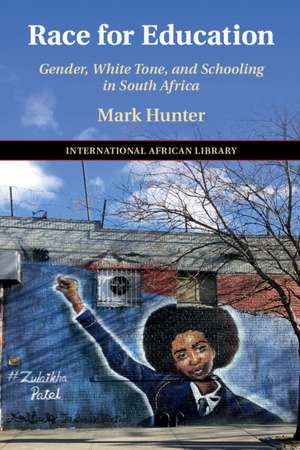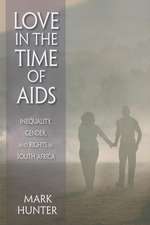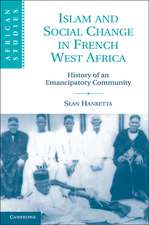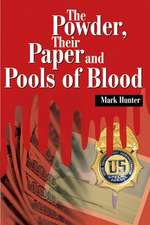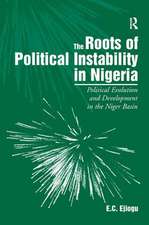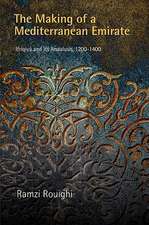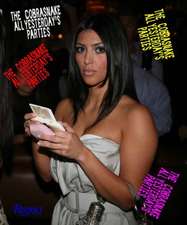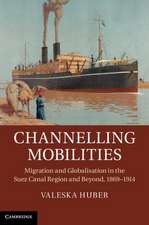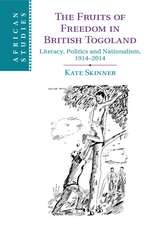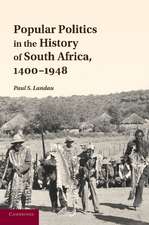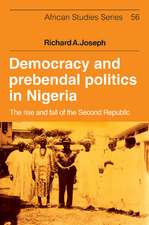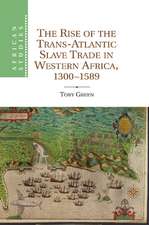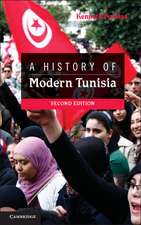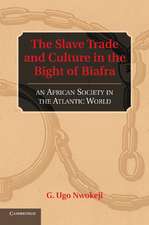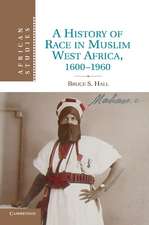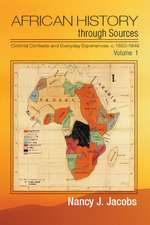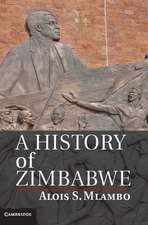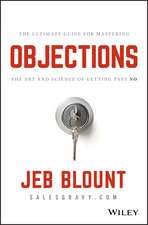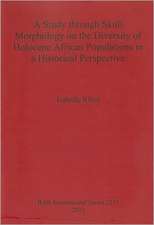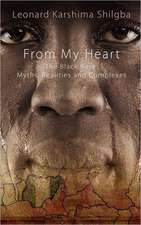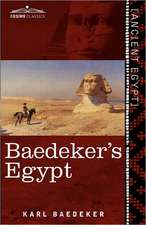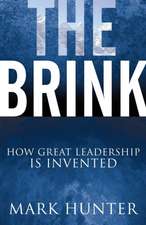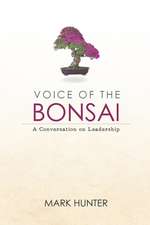Race for Education: Gender, White Tone, and Schooling in South Africa: The International African Library, cartea 60
Autor Mark Hunteren Limba Engleză Paperback – 23 ian 2019
| Toate formatele și edițiile | Preț | Express |
|---|---|---|
| Paperback (1) | 213.63 lei 6-8 săpt. | |
| Cambridge University Press – 23 ian 2019 | 213.63 lei 6-8 săpt. | |
| Hardback (1) | 557.26 lei 6-8 săpt. | |
| Cambridge University Press – 23 ian 2019 | 557.26 lei 6-8 săpt. |
Din seria The International African Library
-
 Preț: 230.54 lei
Preț: 230.54 lei -
 Preț: 229.90 lei
Preț: 229.90 lei - 9%
 Preț: 592.44 lei
Preț: 592.44 lei - 14%
 Preț: 891.04 lei
Preț: 891.04 lei - 11%
 Preț: 583.36 lei
Preț: 583.36 lei -
 Preț: 202.36 lei
Preț: 202.36 lei -
 Preț: 282.48 lei
Preț: 282.48 lei -
 Preț: 264.64 lei
Preț: 264.64 lei - 11%
 Preț: 636.34 lei
Preț: 636.34 lei -
 Preț: 226.17 lei
Preț: 226.17 lei -
 Preț: 285.37 lei
Preț: 285.37 lei -
 Preț: 323.27 lei
Preț: 323.27 lei -
 Preț: 289.01 lei
Preț: 289.01 lei -
 Preț: 326.15 lei
Preț: 326.15 lei -
 Preț: 287.66 lei
Preț: 287.66 lei -
 Preț: 288.25 lei
Preț: 288.25 lei -
 Preț: 285.54 lei
Preț: 285.54 lei -
 Preț: 285.54 lei
Preț: 285.54 lei -
 Preț: 306.47 lei
Preț: 306.47 lei -
 Preț: 285.75 lei
Preț: 285.75 lei -
 Preț: 284.17 lei
Preț: 284.17 lei -
 Preț: 285.37 lei
Preț: 285.37 lei -
 Preț: 283.03 lei
Preț: 283.03 lei -
 Preț: 279.76 lei
Preț: 279.76 lei -
 Preț: 281.30 lei
Preț: 281.30 lei -
 Preț: 282.48 lei
Preț: 282.48 lei - 11%
 Preț: 584.90 lei
Preț: 584.90 lei - 11%
 Preț: 585.59 lei
Preț: 585.59 lei - 11%
 Preț: 581.48 lei
Preț: 581.48 lei
Preț: 213.63 lei
Nou
Puncte Express: 320
Preț estimativ în valută:
40.88€ • 42.24$ • 34.01£
40.88€ • 42.24$ • 34.01£
Carte tipărită la comandă
Livrare economică 19 martie-02 aprilie
Preluare comenzi: 021 569.72.76
Specificații
ISBN-13: 9781108727631
ISBN-10: 1108727638
Pagini: 320
Dimensiuni: 151 x 228 x 17 mm
Greutate: 0.45 kg
Editura: Cambridge University Press
Colecția Cambridge University Press
Seria The International African Library
Locul publicării:Cambridge, United Kingdom
ISBN-10: 1108727638
Pagini: 320
Dimensiuni: 151 x 228 x 17 mm
Greutate: 0.45 kg
Editura: Cambridge University Press
Colecția Cambridge University Press
Seria The International African Library
Locul publicării:Cambridge, United Kingdom
Cuprins
1. Introduction; Part I. Racial Modernism, 1950s and '60s: 2. 'Larney' and 'rough and tough' schools: the making of White Durban; 3. Umlazi township and the gendered 'bond of education'; Part II. Marketised Assimilation, late 1970s–1990s: 4. The routes of schooling desegregation: protest, cooption, and marketised assimilation, 1976–2000; Part III. Schooling and Work after Apartheid: 5. From school to work: symbolic power and social networks; Part IV. Racialised Market, 2000s–: 6. 'What can you do for the school?' The racialised market, 2000s–; 7. New families on the bluff: selling a child in the schooling market; 8. Beneath the 'black tax' in Umlazi: class, family relations and schooling; 9. Conclusions: hegemony on a school bus.
Recenzii
'Mark Hunter has produced the definitive text on the sociology of urban education in South Africa … the book offers a novel account of how post-apartheid educational reforms have not led to the 'de-whitening' of the grammar of privilege … [and] to understandings of schooling and youth identity in globalised cities.' Aslam Fataar, Universiteit Stellenbosch, South Africa and former President of the South African Education Research Association
'Hunter takes an issue at the centre of contemporary politics - schooling - and, through extensive ethnographic and archival research, elucidates the many inequalities at work while providing a deeply humanising portrait of those who face some of the greatest structural obstacles. This book sets a new standard for analysing the interplay of race and class in South Africa, one that is subtly attuned to gendered dynamics and linguistic formations.' Lynn M. Thomas, University of Washington
'[Hunter's] research challenges the common-sense view that desegregated schools would be the lynchpin of deracialisation. This is a fine and original study of the remaking of race with implications well beyond South Africa's borders.' Shireen Hassim, University of the Witwatersrand, Johannesburg
'Mark Hunter has written another outstanding and hugely insightful book. This book establishes a new reading of South Africa's society and urban spaces, looking in detail at the case of Durban. He brings a sophisticated spatial perspective to understand new forms of racialisation of the prospects of South Africa's children, and of the profound inequalities created by education.' Jennifer Robinson, University College London
'This is a subtle, thoughtful, carefully argued book about the foundations of the enduring power of 'white tone' in post-apartheid South Africa.' Jonny Steinberg, University of Oxford
'… the most important study of race and class written in a long time, one that could be read with great profit even by those who know little about South Africa.' Bill Freund, Social History
'The book adds to our growing understanding of the ways in which South Africa's 'transition' occurred in diverse ways in multiple institutional sites and spaces … an important contribution to urgent debates over the place of schooling in (re)making race and inequality.' Rachel E. Johnson, English Historical Review
'… the book combines rigorous historical research, forays into isiZulu linguistics and detailed ethnography. This makes for a readable book that provokes critical questions about the meanings of race, class formation and the value of education in unequal societies.' Christopher Webb, Journal of Southern African Studies
'Race for Education is a welcome addition to the literature on the history and politics of schooling and inequality in South Africa … the depth and breadth of the research and the window it provides into different worlds of schooling in the first two decades after apartheid-make this book essential reading for anyone looking for a deeper understanding of contemporary South African social dynamics.' Linda Chisholm, American Historical Review
'Hunter takes an issue at the centre of contemporary politics - schooling - and, through extensive ethnographic and archival research, elucidates the many inequalities at work while providing a deeply humanising portrait of those who face some of the greatest structural obstacles. This book sets a new standard for analysing the interplay of race and class in South Africa, one that is subtly attuned to gendered dynamics and linguistic formations.' Lynn M. Thomas, University of Washington
'[Hunter's] research challenges the common-sense view that desegregated schools would be the lynchpin of deracialisation. This is a fine and original study of the remaking of race with implications well beyond South Africa's borders.' Shireen Hassim, University of the Witwatersrand, Johannesburg
'Mark Hunter has written another outstanding and hugely insightful book. This book establishes a new reading of South Africa's society and urban spaces, looking in detail at the case of Durban. He brings a sophisticated spatial perspective to understand new forms of racialisation of the prospects of South Africa's children, and of the profound inequalities created by education.' Jennifer Robinson, University College London
'This is a subtle, thoughtful, carefully argued book about the foundations of the enduring power of 'white tone' in post-apartheid South Africa.' Jonny Steinberg, University of Oxford
'… the most important study of race and class written in a long time, one that could be read with great profit even by those who know little about South Africa.' Bill Freund, Social History
'The book adds to our growing understanding of the ways in which South Africa's 'transition' occurred in diverse ways in multiple institutional sites and spaces … an important contribution to urgent debates over the place of schooling in (re)making race and inequality.' Rachel E. Johnson, English Historical Review
'… the book combines rigorous historical research, forays into isiZulu linguistics and detailed ethnography. This makes for a readable book that provokes critical questions about the meanings of race, class formation and the value of education in unequal societies.' Christopher Webb, Journal of Southern African Studies
'Race for Education is a welcome addition to the literature on the history and politics of schooling and inequality in South Africa … the depth and breadth of the research and the window it provides into different worlds of schooling in the first two decades after apartheid-make this book essential reading for anyone looking for a deeper understanding of contemporary South African social dynamics.' Linda Chisholm, American Historical Review
Notă biografică
Descriere
An examination of families and schools in South Africa, revealing how the marketisation of schooling works to uphold the privilege of whiteness.
